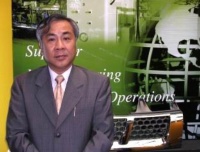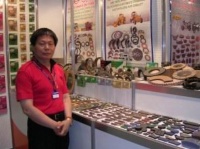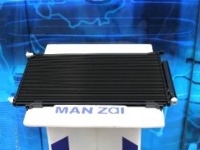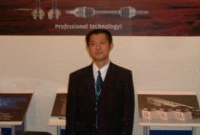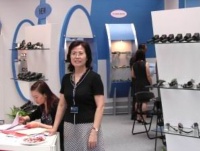Competitors on the Run, Taiwan's Auto Parts Makers Turn Sights to Expansion
Jun 29, 2004 Ι Industry In-Focus Ι Auto Parts and Accessories Ι By Quincy, CENS
Taiwan's aftermaket (AM) auto-parts industry has succeeded in keeping global competitors at bay, especially those from South Korea and mainland China, through its advantages in price, product choice, product-development speed, and international sales channels, according to many industry leaders participating at the recent 2004 Taipei Int'l Auto/Motorcycle Parts & Accessories Show (Taipei AMPA 2004).
During the event the AM parts makers also announced ambitious business-expansion projects to meet anticipated growth in demand. Most of the firms in question have evolved from AM parts makers into original equipment (OE), or tier-one, parts suppliers to many international automakers.
Many of the top AM parts manufacturers in Taiwan started as small-scale producers, most over 20 years ago. Their businesses began to take off in the 1990s, when they all but shut their Italian rivals out of the global market. The industry then entered a period of fierce price competition in major overseas markets, especially the U.S. and Europe. This contest whittled out many weaker firms, but those that survived are today in prime fighting condition and able, the industry leaders say, to take on almost anyone, anywhere.
Largest Die/Mold Plant in Taiwan
Among the survivors is Pro Fortune Industry Co., Ltd., the world's second-biggest plastic auto body-parts maker, which has a global reputation for strong mold and die development capability. The company also rivals the industry's No. 1 player--Tong Yang Industrial Co., Ltd.--in terms of product selection.
At Taipei AMPA 2004, Pro Fortune chairman Webber Lee announced that his company would soon set up Taiwan's largest mold plant for plastic auto parts, with a total investment of over NT$300 million (US$8.93 million at US$1:NT$33.6).
Lee says that Pro Fortune completed a share-swap with Tong Yang about three years ago and now is like a "tiger with a pair of wings." As partners, the two companies are well poised to expand their share of the global AM market through cooperative mold and die development, Lee says.
Pro Fortune has over 500 sets of molds and dies, mainly for bumper and grill products, and the company develops around 40 new grill and 20 bumper models per year at an investment outlay of about NT$150 million to NT$200 million (US$4.5 million to US$6 million). After the establishment of the new mold and die plant, according to Lee, his company and Tong Yang will respectively pour about NT$300 million (US$8.93 million) into product development per year and share each other's product lines.
Lee says that Pro Fortune's competitive edge lies in the company's strong mold and die development capability. In fact, the company has begun supplying plastic parts molds to Toyota, Honda and Daihatsu's overseas car plants.
Pro Fortune's new mold and die plant will help the company lower costs, shorten delivery times and improve efficiency, techniques and designs, according to Lee. The company is also eyeing the car-modification plastic parts business with automakers worldwide. "It is a new era in the OE plastic body parts business," Lee says. "More and more automakers will give only ideas and specifications rather than samples or blueprints to tier-one parts makers. Companies without mold and die design capability will be weeded out from the OE supply chain."
Lee aims to take his company even further up the technology ladder by adopting high-end precision equipment to aid the design and development of plastic molds.
Pro Fortune expects to have revenue of NT$750 million to NT$800 million (US$22.32 million to US$23.81 million) this year and the figure is expected to grow by two to 2.5 times within the coming three to five years, Lee says.
Non-Brake Brake Shoes & Pads
Another company that has prospered in the international market is Nan Hoang Traffic Instrument Co., Ltd., the No. 1 maker of friction materials and products. Fred Cheng, president of the ISO/TS-16949 certified company, says Nan Hoang will move to a big new plant in a high-tech industrial zone in southern Taiwan by the end of the year.
Cheng notes that the new NT$200 million (US$6 million) plant will be three times bigger than the company's current plant. The new facility will also house a friction materials R&D center--one of only two such centers in Asia (the other one is located in Japan).
The materials R&D center will be equipped with NT$60 million (US$1.79 million) in testing and inspection equipment, and all the R&D staff there will have professional certifications in their areas of expertise. The center will also work closely with the labs of leading international companies and research institutes in the area of mutual certification and authorization.
"Nan Hoang's global competitiveness lies in our unmatched development capability," Cheng claims. "For example, we have developed over 80 non-asbestos friction materials in the past two years and all of them meet the OE supply quality requirements of major automakers. We have positioned our company to play a vital role in upgrading the global status of Taiwan's auto parts industry. To this end we invest intensively every year and utilize the most advanced equipment to develop over 200 new items per year, including brake linings, shoes and pads as well as clutch plates for autos, motorcycles, agricultural machines and other machinery."
Established in 1961, Nan Hoang is the largest and most experienced parts maker in Taiwan. The company now boasts a product lineup of over 4,000 items, and the figure keeps growing. Last year, Nan Hoang developed Taiwan's first series of full-metal brake shoes and pads, which can withstand temperatures up to 600 degrees Celsius. They are made with special materials that deliver a highly stable friction index at high temperatures and under wet working environments. Cheng says that the full-metal friction materials were first applied on aircraft and military armored vehicles and introduced into luxury automobile in recent years.
Gasket Leader
Cada Industrial Co., Ltd., one of the top two makers of AM engine gaskets and repair kits in Taiwan and the island's first ISO/TS-6949 approved gasket company, also announced expansion plans at AMPA this year.
According to company chairman Nick Chen and vice chairman Huang Shu-hui, Cada will set up a new plant with total floor area of 19,800 square meters next to its current facility by the end of the year for total investment of over NT$200 million (US$5.95 million). The new facility will be twice the size of its current plant and will double its annual gasket production volume to about 2.5 million pieces.
Cada was founded 20 years ago and currently sells engine gaskets and repair kits for 2,000 to 3,000 Japanese, South Korean and American car models. Chen says that his company spends about NT$50 million (US$1.49 million) on development of 30 to 50 sets of gaskets and repair kits per year.
Cada currently produces about 70% of its products under its "Eristic" brand and sells the remainder to OEM and original design manufacturing (ODM) customers. In recent years, the company has been accelerating development of gaskets for European car and truck models. In its commitment to making durable and reliable products that exceed original-equipment (OE) quality, Cada adds silicon liners to all of the water and oil holes on its gaskets to prevent leakage. It also uses thick gasket plate bases made of asbestos, metal and over 100 kinds of non-asbestos composite materials. It also adopts double-layer metal bore rings to improve durability.
Integrated Condenser/Receiver Dryers
Man Zai Industrial Co., Ltd., Taiwan's No. 1 supplier of AM condensers and evaporators for automobile air-conditioning systems and a leading OE supplier of such products to auto makers in Taiwan and abroad, demonstrated its latest items at AMPA this year. The company also announced that its new plant in Fujian Province, mainland China will begin mass production by the end of this year.
With solid technical background in condenser and evaporators, Man Zai diversified into auto radiator production in 2000 with technical support from Delphi Automotive Systems of the United States.
Grace Chiang, who heads Man Zai's export department, says that his company's mainland plant will simultaneously produce radiators and evaporators with an annual capacity of 500,000 units, twofold that of its current plant in Taiwan. The OE items will be supplied to South East Motor Corp.--an auto-production venture between Taiwan's China Motor Corp. (partner of Mitsubishi of Japan) and a provincial government-run automobile conglomerate there--and several other automakers in China.
At the show, Man Zai touted its latest condensers with integrated receiver dryers. According to Chiang, this product weighs less and requires less space and material than ordinary condensers.
With a strong ambition to become a major player in the global market, Man Zai is aggressively developing new materials and techniques for new-generation automobile cooling solutions, including integrated radiator and condenser models, like those found on a few European sub-compact car models, says Chiang. The company is also developing all-aluminum radiators, which are appearing on some SUV models in the U.S.
While technology has not posed a problem for Man Zai in the radiator business, the company has been challenged to find ways to expand rapidly in the segment. After intensive evaluations, Man Zai decided to cooperate with Delphi to quickly access core techniques, though it still does its own production in-house.
Currently, the company supplies about 1,200 condenser models, mainly serpentine and parallel-flow types, and about 1,000 evaporators, mainly parallel-flow and laminated models. Man Zai exports most of its condensers and evaporators to the U.S. and European AM markets. The company has also developed over 50 AM radiator models for mainly American cars and supplies several models to a local producer of Daewoo cars on an OE basis. "It is just a start," Chiang claims, "Any maker that wants to tap the U.S. AM market has to have at least 200 radiator models."
Last year, Man Zai exported over 200,000 condensers and about 150,000 evaporators. All of this output was produced at the company's integrated plant in southern Taiwan's Tainan, where the company currently employs about 200 workers.
Award-Winning Driveshaft Assemblies
YAC Auto Technology Industry Co. Ltd. Is one of the only two auto-parts makers in Taiwan to have been awarded the "It's Very Well Made in Taiwan" mark by the Ministry of Economic Affairs (MOEA), thanks to its superb heat-treatment processes. At AMPA the company announced plans to expand its plant to meet a flood of orders and to enable the diversification of its product lineup.
YAC general manager Shih Ming-yuan says that his company has been constantly expanding its production facilities in Taiwan to meet demand. Currently YAC supplies drive-shaft assemblies, CV joints, and shafts to the global AM market, with 80% of its output for the AM segment and the rest on an OE basis.
Shih attributes YAC's market-leading position to the company's high quality standards, achieved through the use of the best materials, most advanced heat-treatment techniques, high precision processing equipment, and highly-trained assemblers in Taiwan. These strengths, Shih claims, have helped YAC defeat major rivals and gain a solid foothold in the global AM market.
Last year, YAC shipped about 400,000 drive shaft assemblies, 60% of which were for Japanese cars and 40% for European and American models. The company supplies assemblies for over 500 car models, and its product list is growing by 50 items per year.
Shih claims that YAC's global competitiveness also owes to its small-batch, large-variety production mode and market segmentation strategy. In addition, the company can flexibly supply complete-set or parts-only products to customers worldwide according to their needs.
With established sales channels worldwide and extensive technical know-how, YAC has been diversifying its product lines in the area of vehicle chassis parts, including bearings, wheel hub assemblies, and hydraulic steering racks for passenger cars, drive shafts for all terrain vehicles (ATVs), and rear-shaft for fork-lifts.
Supplier to Mercedes-Benz
Over 40 big foreign buyers visited Fair Sun Industrial Corp.'s booth at the Taipei parts show, including OE-parts procurement officials from General Motors of the U.S., showing the Taiwan company's capability in supplying high-quality electrical auto parts.
Fair Sun specializes in auto bulbs, relays, switches, solenoids, regulators, turn-signal switches, and other electrical auto parts. The company invests an average of NT$100 million (US$2.98 million) to develop around 30 new molds and dies each year. Currently, Fair Sun supplies electrical parts to many big international AM parts brands, including items for most of the popular car models in Europe and Volvo, Scania and DAF trucks.
Quality and constant product development are the key factors to the Fair Sun's success, according to company vice president Lourdes Chiu.
Chiu says that his company achieves its high level of quality by operating an integrated plant in China that produces products with key parts and components imported from Taiwan. The company also invests heavily in mold and die development, and it now can supply thousands of different types of parts.
During the event the AM parts makers also announced ambitious business-expansion projects to meet anticipated growth in demand. Most of the firms in question have evolved from AM parts makers into original equipment (OE), or tier-one, parts suppliers to many international automakers.
Many of the top AM parts manufacturers in Taiwan started as small-scale producers, most over 20 years ago. Their businesses began to take off in the 1990s, when they all but shut their Italian rivals out of the global market. The industry then entered a period of fierce price competition in major overseas markets, especially the U.S. and Europe. This contest whittled out many weaker firms, but those that survived are today in prime fighting condition and able, the industry leaders say, to take on almost anyone, anywhere.
Largest Die/Mold Plant in Taiwan
Among the survivors is Pro Fortune Industry Co., Ltd., the world's second-biggest plastic auto body-parts maker, which has a global reputation for strong mold and die development capability. The company also rivals the industry's No. 1 player--Tong Yang Industrial Co., Ltd.--in terms of product selection.
Webber Lee, chairman of Pro Fortune, announces plans to set up the largest plastic auto-body parts mold plant in Taiwan.
Lee says that Pro Fortune completed a share-swap with Tong Yang about three years ago and now is like a "tiger with a pair of wings." As partners, the two companies are well poised to expand their share of the global AM market through cooperative mold and die development, Lee says.
Pro Fortune has over 500 sets of molds and dies, mainly for bumper and grill products, and the company develops around 40 new grill and 20 bumper models per year at an investment outlay of about NT$150 million to NT$200 million (US$4.5 million to US$6 million). After the establishment of the new mold and die plant, according to Lee, his company and Tong Yang will respectively pour about NT$300 million (US$8.93 million) into product development per year and share each other's product lines.
Lee says that Pro Fortune's competitive edge lies in the company's strong mold and die development capability. In fact, the company has begun supplying plastic parts molds to Toyota, Honda and Daihatsu's overseas car plants.
Pro Fortune's new mold and die plant will help the company lower costs, shorten delivery times and improve efficiency, techniques and designs, according to Lee. The company is also eyeing the car-modification plastic parts business with automakers worldwide. "It is a new era in the OE plastic body parts business," Lee says. "More and more automakers will give only ideas and specifications rather than samples or blueprints to tier-one parts makers. Companies without mold and die design capability will be weeded out from the OE supply chain."
Lee aims to take his company even further up the technology ladder by adopting high-end precision equipment to aid the design and development of plastic molds.
Pro Fortune expects to have revenue of NT$750 million to NT$800 million (US$22.32 million to US$23.81 million) this year and the figure is expected to grow by two to 2.5 times within the coming three to five years, Lee says.
Non-Brake Brake Shoes & Pads
Fred Cheng, chairman of Nan Hoang, announces his company`s plan to set up a friction-material R&D center.
Cheng notes that the new NT$200 million (US$6 million) plant will be three times bigger than the company's current plant. The new facility will also house a friction materials R&D center--one of only two such centers in Asia (the other one is located in Japan).
The materials R&D center will be equipped with NT$60 million (US$1.79 million) in testing and inspection equipment, and all the R&D staff there will have professional certifications in their areas of expertise. The center will also work closely with the labs of leading international companies and research institutes in the area of mutual certification and authorization.
"Nan Hoang's global competitiveness lies in our unmatched development capability," Cheng claims. "For example, we have developed over 80 non-asbestos friction materials in the past two years and all of them meet the OE supply quality requirements of major automakers. We have positioned our company to play a vital role in upgrading the global status of Taiwan's auto parts industry. To this end we invest intensively every year and utilize the most advanced equipment to develop over 200 new items per year, including brake linings, shoes and pads as well as clutch plates for autos, motorcycles, agricultural machines and other machinery."
Established in 1961, Nan Hoang is the largest and most experienced parts maker in Taiwan. The company now boasts a product lineup of over 4,000 items, and the figure keeps growing. Last year, Nan Hoang developed Taiwan's first series of full-metal brake shoes and pads, which can withstand temperatures up to 600 degrees Celsius. They are made with special materials that deliver a highly stable friction index at high temperatures and under wet working environments. Cheng says that the full-metal friction materials were first applied on aircraft and military armored vehicles and introduced into luxury automobile in recent years.
Gasket Leader
Cada Industrial Co., Ltd., one of the top two makers of AM engine gaskets and repair kits in Taiwan and the island's first ISO/TS-6949 approved gasket company, also announced expansion plans at AMPA this year.
According to company chairman Nick Chen and vice chairman Huang Shu-hui, Cada will set up a new plant with total floor area of 19,800 square meters next to its current facility by the end of the year for total investment of over NT$200 million (US$5.95 million). The new facility will be twice the size of its current plant and will double its annual gasket production volume to about 2.5 million pieces.
Cada was founded 20 years ago and currently sells engine gaskets and repair kits for 2,000 to 3,000 Japanese, South Korean and American car models. Chen says that his company spends about NT$50 million (US$1.49 million) on development of 30 to 50 sets of gaskets and repair kits per year.
Cada currently produces about 70% of its products under its "Eristic" brand and sells the remainder to OEM and original design manufacturing (ODM) customers. In recent years, the company has been accelerating development of gaskets for European car and truck models. In its commitment to making durable and reliable products that exceed original-equipment (OE) quality, Cada adds silicon liners to all of the water and oil holes on its gaskets to prevent leakage. It also uses thick gasket plate bases made of asbestos, metal and over 100 kinds of non-asbestos composite materials. It also adopts double-layer metal bore rings to improve durability.
Integrated Condenser/Receiver Dryers
Man Zai Industrial Co., Ltd., Taiwan's No. 1 supplier of AM condensers and evaporators for automobile air-conditioning systems and a leading OE supplier of such products to auto makers in Taiwan and abroad, demonstrated its latest items at AMPA this year. The company also announced that its new plant in Fujian Province, mainland China will begin mass production by the end of this year.
With solid technical background in condenser and evaporators, Man Zai diversified into auto radiator production in 2000 with technical support from Delphi Automotive Systems of the United States.
Grace Chiang, who heads Man Zai's export department, says that his company's mainland plant will simultaneously produce radiators and evaporators with an annual capacity of 500,000 units, twofold that of its current plant in Taiwan. The OE items will be supplied to South East Motor Corp.--an auto-production venture between Taiwan's China Motor Corp. (partner of Mitsubishi of Japan) and a provincial government-run automobile conglomerate there--and several other automakers in China.
At the show, Man Zai touted its latest condensers with integrated receiver dryers. According to Chiang, this product weighs less and requires less space and material than ordinary condensers.
With a strong ambition to become a major player in the global market, Man Zai is aggressively developing new materials and techniques for new-generation automobile cooling solutions, including integrated radiator and condenser models, like those found on a few European sub-compact car models, says Chiang. The company is also developing all-aluminum radiators, which are appearing on some SUV models in the U.S.
While technology has not posed a problem for Man Zai in the radiator business, the company has been challenged to find ways to expand rapidly in the segment. After intensive evaluations, Man Zai decided to cooperate with Delphi to quickly access core techniques, though it still does its own production in-house.
Currently, the company supplies about 1,200 condenser models, mainly serpentine and parallel-flow types, and about 1,000 evaporators, mainly parallel-flow and laminated models. Man Zai exports most of its condensers and evaporators to the U.S. and European AM markets. The company has also developed over 50 AM radiator models for mainly American cars and supplies several models to a local producer of Daewoo cars on an OE basis. "It is just a start," Chiang claims, "Any maker that wants to tap the U.S. AM market has to have at least 200 radiator models."
Last year, Man Zai exported over 200,000 condensers and about 150,000 evaporators. All of this output was produced at the company's integrated plant in southern Taiwan's Tainan, where the company currently employs about 200 workers.
Award-Winning Driveshaft Assemblies
YAC Auto Technology Industry Co. Ltd. Is one of the only two auto-parts makers in Taiwan to have been awarded the "It's Very Well Made in Taiwan" mark by the Ministry of Economic Affairs (MOEA), thanks to its superb heat-treatment processes. At AMPA the company announced plans to expand its plant to meet a flood of orders and to enable the diversification of its product lineup.
Shih Ming-yuan, general manager of YAC, Taiwan`s largest AM driveshaft-assembly maker, is confident about his company`s prospects.
Shih attributes YAC's market-leading position to the company's high quality standards, achieved through the use of the best materials, most advanced heat-treatment techniques, high precision processing equipment, and highly-trained assemblers in Taiwan. These strengths, Shih claims, have helped YAC defeat major rivals and gain a solid foothold in the global AM market.
Last year, YAC shipped about 400,000 drive shaft assemblies, 60% of which were for Japanese cars and 40% for European and American models. The company supplies assemblies for over 500 car models, and its product list is growing by 50 items per year.
Shih claims that YAC's global competitiveness also owes to its small-batch, large-variety production mode and market segmentation strategy. In addition, the company can flexibly supply complete-set or parts-only products to customers worldwide according to their needs.
With established sales channels worldwide and extensive technical know-how, YAC has been diversifying its product lines in the area of vehicle chassis parts, including bearings, wheel hub assemblies, and hydraulic steering racks for passenger cars, drive shafts for all terrain vehicles (ATVs), and rear-shaft for fork-lifts.
Supplier to Mercedes-Benz
Over 40 big foreign buyers visited Fair Sun Industrial Corp.'s booth at the Taipei parts show, including OE-parts procurement officials from General Motors of the U.S., showing the Taiwan company's capability in supplying high-quality electrical auto parts.
Lourdes Chiu, vice president of Fair Sun, stands in front of her company`s new OE turn-signal and wiper switches.
Quality and constant product development are the key factors to the Fair Sun's success, according to company vice president Lourdes Chiu.
Chiu says that his company achieves its high level of quality by operating an integrated plant in China that produces products with key parts and components imported from Taiwan. The company also invests heavily in mold and die development, and it now can supply thousands of different types of parts.
©1995-2006 Copyright China Economic News Service All Rights Reserved.






